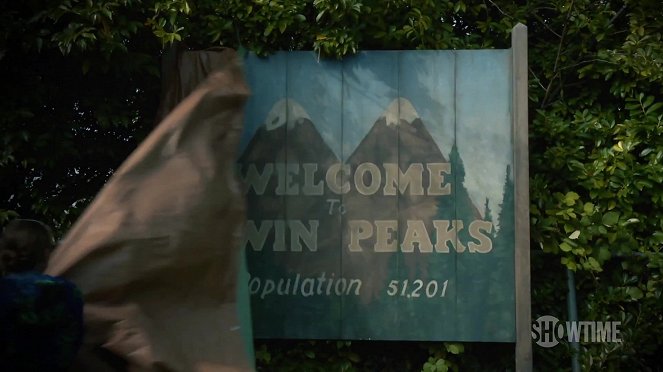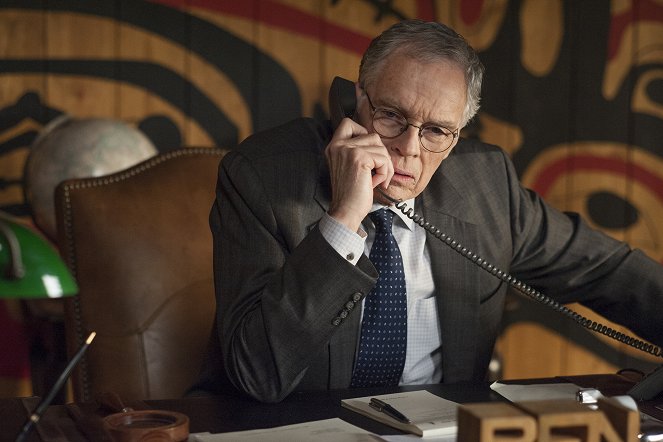Directed by:
David LynchCinematography:
Peter DemingComposer:
Angelo BadalamentiCast:
Kyle MacLachlan, Michael Horse, David Lynch, Miguel Ferrer, Chrysta Bell, Naomi Watts, Robert Forster, Laura Dern, Kimmy Robertson, Harry Goaz, Don Murray (more)Episodes(18)
-
Episode 1 (S03E01)
-
Episode 2 (S03E02)
-
Episode 3 (S03E03)
-
Episode 4 (S03E04)
-
Episode 5 (S03E05)
-
Episode 6 (S03E06)
-
Episode 7 (S03E07)
-
Episode 8 (S03E08)
-
Episode 9 (S03E09)
-
Episode 10 (S03E10)
-
Episode 11 (S03E11)
-
Episode 12 (S03E12)
-
Episode 13 (S03E13)
-
Episode 14 (S03E14)
-
Episode 15 (S03E15)
-
Episode 16 (S03E16)
-
Episode 17 (S03E17)
-
Episode 18 (S03E18)
Plots(1)
A quarter century after revolutionizing television, Twin Peaks returns. Expanding the world you thought you knew, this limited event series takes you places wonderful, strange and farther out. (Universal Pictures UK)
Videos (5)
Reviews (3)
In the second season of Twin Peaks, David Lynch dropped a bomb and shuffled all characters and motives in all possible directions. This time, he went for the atom bomb – literally, so the storyline can go absolutely anywhere. We’ve entered an uncharted zone of Twin Peaks. It’s a journey inside Lynch’s utterly unpredictable mind. Besides, with eighteen hours of such an unprecedented TV creation, I doubt anyone will ever produce anything even stranger and crazier. Unless it is Lynch himself coming back to Twin Peaks one last time. Fingers crossed.
()
This is not the Dale Cooper that I knew. It's not due to the ravages of time or by how he changed or how he looks. It's something that is definitely not there anymore," says Diana to her former superior, alias director David Lynch, perfectly capturing the problem that many viewers will have with the third season of the famous series. When David tweeted, "Your favorite gum is going to be back in style," he foolishly made a mistake. Not only because he no longer has a monopoly on gum but also because others have taken over the taste of his product and added additional ingredients. The first season perfectly fulfilled the expectations of a more educated younger audience who were no longer interested in old, outdated formats aimed at mass appeal. As a result, the studios could come up with something bolder. Lynch caused a revolution by saying, "Forget the main plot, instead, let's play with the characters and subplots, focus on entertaining games and details." It worked. Twenty years later, new technologies and new distribution methods came along, and so Lynch thought it was time for a new revolution. If I were sarcastic, I would say that he directed the third season of Twin Peaks to infuriate and depress TV viewers, as well as to test the loyalty of his fan club and the strength of the Twin Peaks brand. The latter passed with flying colors, and it was interesting to see how, after the first episode, when it was still unclear what the project would turn into, five-star ratings quickly accumulated. I see the peak of Lynch's work in three titles: the first season of Twin Peaks, Lost Highway, and Mulholland Drive. Of course, they were different, but they had one thing in common: No matter how they worked with mystery, no matter how much they resisted a clear interpretation of their world, the director always counted on the viewer. In the case of Inland Empire, I felt for the first time that Lynch's style and self-centeredness suppressed everything else, and Return seems like a continuation of this trend. In Twin Peaks: The Return, Lynch appears as an experimenter who tests the very boundaries of TV creations. He even gave up on the characters. They appear and disappear for long periods, and the creators don't allow us to develop a relationship with them. Imagine a regular series as a soccer field where characters/players meet and clash. Simply put, they play. Twin Peaks: The Return, Lynch expanded that field to the size of a provincial town. Characters rarely meet in it; they mostly just wander the landscape, and the viewer wanders as well, wondering what the creator is trying to achieve. Unlike the first two seasons, the plot does not focus on exploring the environment of a small town but rather jumps chaotically from the center of New York to Montana, from there to South Dakota, and then to the spaces of another dimension for a change, for dozens of minutes. Time also jumps, and everything takes forever. The largest space is given to a childlike figure without its own will, against which even Mr. Tau is an example of a Hamlet-like complicated character. I have heard it proclaimed that testing seemingly blind paths also has meaning, but I'm not sure if any statistically significant group of viewers will want to undergo this research along with Lynch. The magic of the original Twin Peaks lies in its originality and entertainment value. Return is only original. Certainly, you will find many atmospheric scenes in there that resemble Lynch's famous times. But these are solitaires that stick out in space without any connection. On the other hand, it is certainly not a bad thing that this series was created. It is such an oddity that it will find its audience. After all, the feeling that you can appreciate something that is inaccessible to the masses of primitive consumers is certainly delightful. I would recommend Return to true surrealists and seasoned viewers of alternative media. The average viewer will most likely avoid it. Overall impression: 40%.
()
(less)
(more)
I can't rate the show, or rather its third season, as something beautiful or great. Nevertheless, even though there are sequences, parts, and concepts that don't sit well with me, the third season still managed to affect me just as strongly as the first two, and in a completely different way. Lynch is so far along in his concept of film/series that you either continue to play his game or you don't. I guess he's got me so wrapped around his finger that I just stared at the way in which a series can be made.
()


